Looking Up, 16-page English PDF Edition, Back Issues and Current Issue
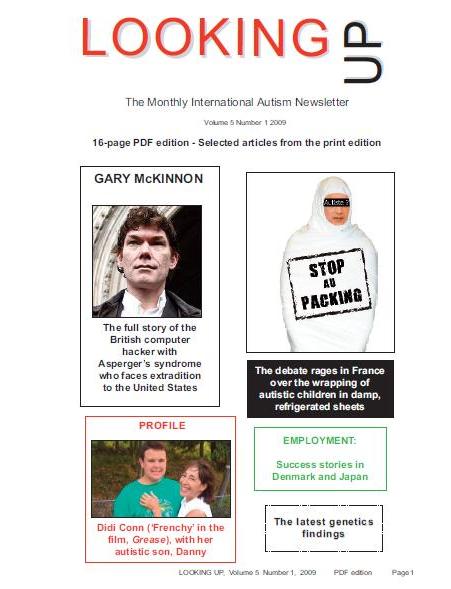
|
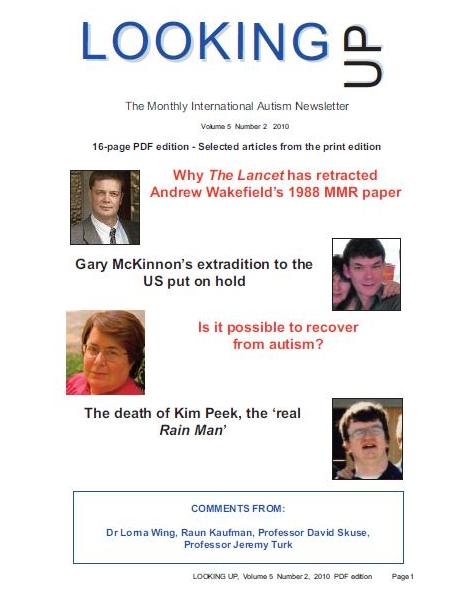
|
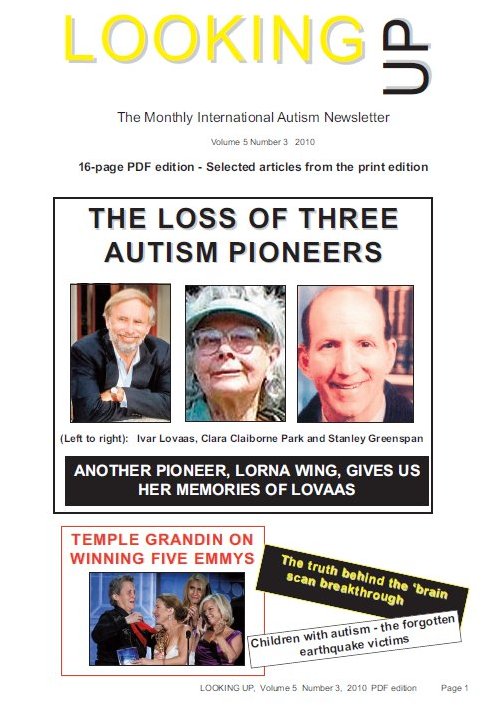
|
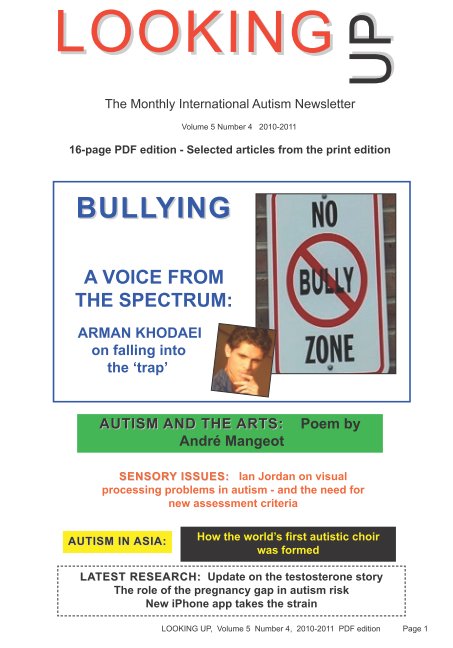
|
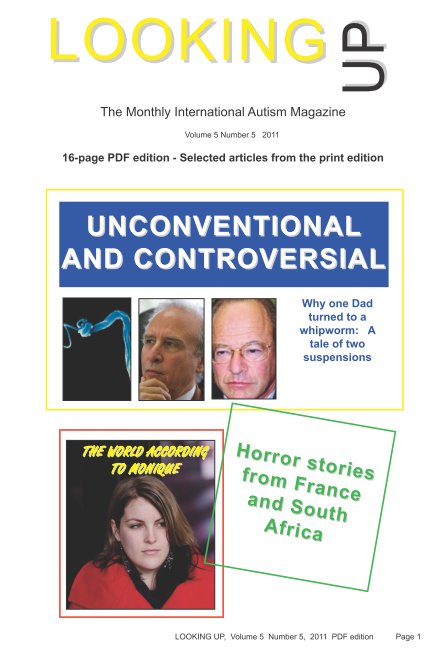
|
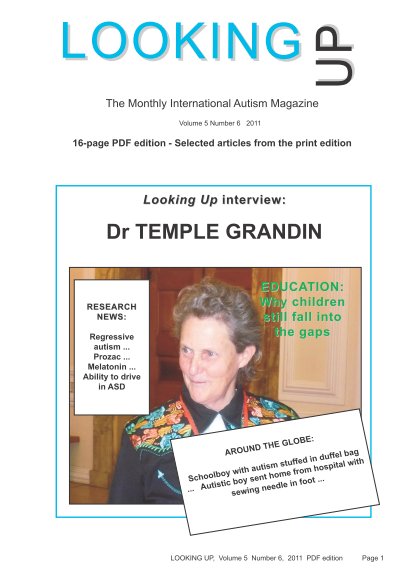
|
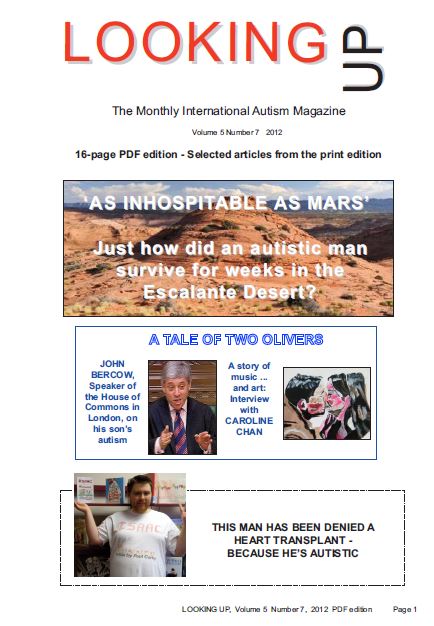
|
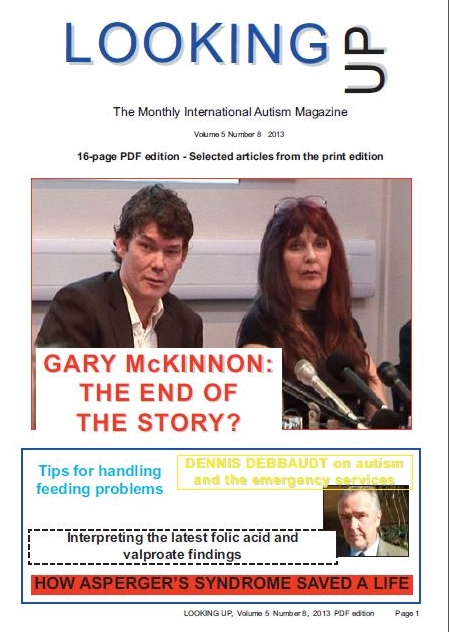
|
| Home page | Subscribe (print edition) | Selected articles | Our publications | Our mailing lists |
| PDF edition | Subscribe (PDF edition) | Back issue contents | Autism books | Contact us |
From Volume 5 Number 4 (print and PDF editions)
CAMBRIDGE, UK: Giving women a small dose of the male sex hormone, testosterone, makes them less able to empathise with others, say British and Dutch researchers. Their findings, published in the journal, PNAS, add weight to the theory that the hormone could be significant in the development of autism.
While various genes possibly linked to the autism have been found, the precise combination of genetics and other environmental factors which produce autism is still unclear.
The latest study, from the universities of Cambridge and Utrecht, tests the idea that the disorder may be the result of an “extreme male brain,” perhaps compromised by exposure to male sex hormones during brain development in the womb.
The rate of autism is much higher among boys than it is among girls. Women, on average, have lower levels of testosterone than men, and 16 volunteers were given a dose of the hormone to see if this affected one of the key areas linked to autism - the ability to empathise.
In standard tests of “mind-reading,” in which subjects look at pictures of faces and try to guess the mood of the person pictured, women tend to do better than men. However, the testosterone dose caused a significant reduction in this “mind-reading” advantage amongst the women.
The findings also hinted at the significance of testosterone exposure in the womb. In men and women, the relative length of the index and fourth finger is different - in men, the index finger tends to be shorter than the ring finger, while in women, it is more likely that the fingers are similarly long, or the index finger longer.
These differences are thought to be generated by differing levels of testosterone exposure before birth. However, the women who did worst at the “mind-reading” test after a dose of the male sex hormone were those whose finger lengths were the most “man-like” in the first place.
Professor Jack van Honk, one of the researchers, said: “We are excited by this finding because it suggests testosterone levels pre-natally prime later testosterone effects on the mind.”
Fellow researcher Professor Simon Baron-Cohen added: “This contributes to our knowledge of how small hormonal differences can have far-reaching effects on the mind.”
Dr Baron-Cohen, an expert on autism and the University of Cambridge's professor of developmental psychopathology, has been a sometimes controversial figure for emphasising the importance of biology over social conditioning in explaining the differences between male and female behaviour. He has championed the idea of autism as an “extreme male brain” because, he claims, many autistic tendencies are exaggerations of typical masculine traits.
Dr Baron-Cohen told Varsity: “The idea of autism being an extreme of the male brain is supported by evidence from psychological and neural measures where there are key sex differences, and where people with autism show an extreme of the typical male profile. But this hypothesis is formulated with a broad brush and our research aims to identify with greater precision where in the brain such atypical development occurs.”
Professor Uta Frith, an autism researcher at University College London, said the findings needed to be treated with caution. She said: “The testosterone theory is interesting, but it is still just one of many theories about the origins of autism. I hope these results can be reproduced by other research teams, as the number of women involved are quite small.”
Richard Mills, from Britain’s National Autistic Society, said that the study was “another piece of the jigsaw,” but while it increased understanding, it did not provide all the answers.
He said: “This is an important piece of research from a reputable team, but it’s not a defining moment, and what concerns us is that there are people who will seek to make capital out of this. We have heard of one group in the US who are using the testosterone theory to justify ‘treating’ children with what is effectively chemical castration, which is plainly wrong.”

|

|

|

|

|

|

|

|
| Current 40-page print edition issue | |||||||||||||||
|---|---|---|---|---|---|---|---|---|---|---|---|---|---|---|---|
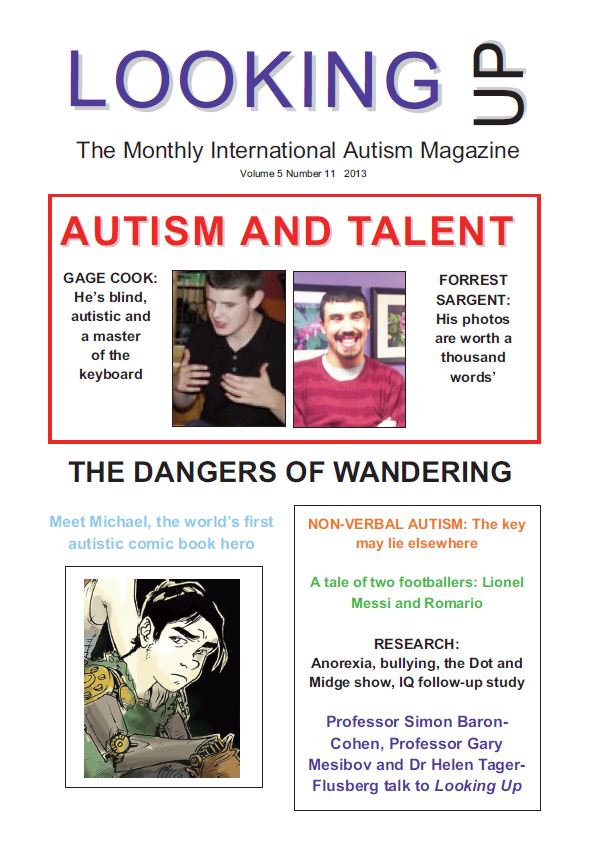
|
| ||||||||||||||
| PRINT EDITION BACK ISSUE CONTENTS AND FRONT COVERS | ||||||||||||||||||||||||||
|---|---|---|---|---|---|---|---|---|---|---|---|---|---|---|---|---|---|---|---|---|---|---|---|---|---|---|
| VOLUME 1, Number: | 1 | 2 | 3 | 4 | 5 | 6 | 7 | 8 | 9 | 10 | 11 | 12 | VOLUME 2, Number: | 1 | 2 | 3 | 4 | 5 | 6 | 7 | 8 | 9 | 10 | 11 | 12 | |
| VOLUME 3, Number: | 1 | 2 | 3 | 4 | 5 | 6 | 7 | 8 | 9 | 10 | 11 | 12 | VOLUME 4, Number: | 1 | 2 | 3 | 4 | 5 | 6 | 7 | 8 | 9 | 10 | 11 | 12 | |
| VOLUME 5, Number: | 1 | 2 | 3 | 4 | 5 | 6 | 7 | 8 | ||||||||||||||||||
| You can find our PDF EDITION CONTENTS AND COVERS on our PDF EDITION BACK ISSUES PAGE | ||||||||||||||||||||||||||
| Home page | Subscribe (print edition) | Selected articles | Our publications | Our mailing lists |
| PDF edition | Subscribe (PDF edition) | Back issue contents | Autism books | Contact us |